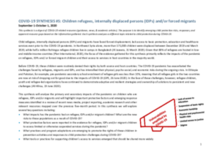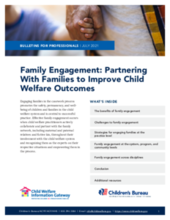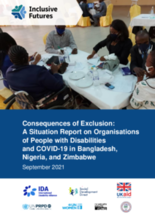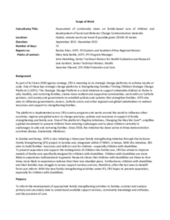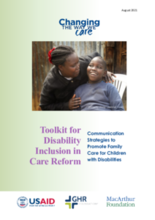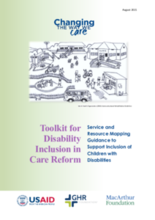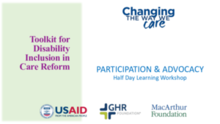Displaying 2291 - 2300 of 14348
El mecanismo de prevención de la separación familiar innecesaria entre Cambiando la forma en que CuidamosSM y la Procuraduría General de la Nación, es un informe que resume la experiencia de Cambiando la forma en que CuidamosSM Guatemala en la implementación de una ruta de prevención de la separación familiar innecesaria con una entidad de gobierno responsable de velar por el cumplimiento de derechos de los NNA, este procedimiento fue realizado con el objetivo de evitar la separación familiar innecesaria a través del seguimiento del caso y la derivación a servicios sociales y especializados, el informe también narra la experiencia en la implementación de juntas técnicas de análisis de caso para determinar el mejor interés para los NNA y familias, este informe está dirigido a profesionales que trabajan con niñes y adolescencia y que están interesados en implementar procedimientos para cerrar la puerta de entrada al cuidado residencial.
Guided by UNICEF’s Child Protection Strategy (2021 – 2030) which provides the overarching strategic framework for UNICEF’s child protection programming globally, the paper discusses key considerations that have shaped this approach.
The purpose of this evidence synthesis is to analyze the primary and secondary impacts of the pandemic on children who are refugees, IDPs and/or migrants and highlights important protective factors and emerging response measures identified in a review of recent news media, project reporting, academic research and other relevant resources mapped over the previous five-month period.
Engaging families in the casework process promotes the safety, permanency, and well-being of children and families in the child welfare system and is central to successful practice. Effective family engagement occurs when child welfare practitioners actively collaborate and partner with the family network, including maternal and paternal relatives and fictive kin, throughout their involvement with the child welfare system and recognizing them as the experts on their respective situations. This bulletin for professionals provides an overview of the foundational elements of the family engagement approach, followed by strategies and promising practices for implementing it.
The COVID-19 pandemic has exacerbated inequalities and barriers to
social inclusion for people with disabilities. These experiences of social
exclusion have been felt to an even greater extent by women with disabilities
and under-represented groups of people with disabilities, leading to a range of
effects on the operations and priorities of OPDs. To address a critical gap in the
evidence base, the Disability Inclusion Helpdesk carried out a rapid assessment
of the role of OPDs during the pandemic, and how the pandemic has affected
OPDs’ operations and priorities.
The Child Rescue Centre was the first orphanage in Sierra Leone to successfully complete a transition from residential to family-based care. This case study highlights some of the key dynamics that arose throughout the transition of the orphanage and examines how those dynamics both influenced the transition and determined the type of support provided as well as the most appropriate transition strategy.
CRS is seeking a consultant to inform the development of appropriate family strengthening activities in Zambia, conduct and analyze primary and secondary data to understand available support services, community knowledge and attitudes, and the provision of care.
In this document, the awareness raising and advocacy is on behalf of or to benefit children with disabilities—many of whom may struggle to communicate because of their disability or whose voices are not heard—and because adults, systems and services often do not consider the opinions of children and children with disabilities are often left behind in changing or improving systems of care.
This guidance specifically refers to mapping of services as the process of locating and sharing information to a wide range of people about available services to support children with disabilities and their families.
This is a presentation for a half-day workshop on participation and self-advocacy approaches for working with children with disabilities and their families; includes slides, facilitation notes and a sample list of country-specific disability rights.



